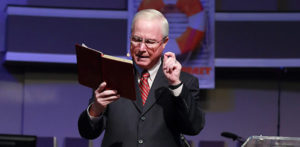‘Shepherding the flock’ looks, feels different with social distancing
Baptist and Reflector

Bruce Chesser is president of the Tennessee Baptist Convention and senior pastor of First Baptist Church, Hendersonville.
FRANKLIN — The COVID-19 pandemic has greatly impacted churches, not just in terms of altering worship services, but well beyond that.
Funerals, weddings, small group gatherings, hospital visitation — all of these things, and more, have had to be changed in accordance with social distance restrictions and other guidelines.
Bruce Chesser, president of the Tennessee Baptist Convention and senior pastor at First Baptist Church, Hendersonville, recently sat down with the Baptist and Reflector to discuss some of these issues on the latest edition on B&R Radio podcast.
The entire podcast (Episode 41) can be found here. Below are some excerpts from the interview:
 B&R: In regard to COVID-19/coronavirus, from your pastoral perspective, what do you see as some of the biggest changes that people have dealt with over these past few weeks?
B&R: In regard to COVID-19/coronavirus, from your pastoral perspective, what do you see as some of the biggest changes that people have dealt with over these past few weeks?
Bruce Chesser: Well, from a church perspective, it’s hard to name anything that has not been touched by it. The employees that we have, the ministries that we have, the ministries missions that we support, every level is affected.
And when you’re dealing with a church, you’ve got so many people, that a church is, it’s not just something they do, it’s really part of who they are, and to lose that is a part of their identity.
It’s not just, “Oh, I didn’t get to go to church this week.” It’s a real loss of something that is very significant in their life. It’s a loss of something that’s significant in my life. … (But) we are learning a new paradigm for doing ministry, which I think, going forward, is going to open some doors for us that we’ve never really adequately addressed. And even when we get past this crisis, whenever that is, no one knows, but when that (happens) and the doors are open and people can come back to church, we now have an open door of ministry, maybe a new mission field that we never considered before.
B&R: With so many churches going to online services, many pastors across the state are saying that they look at the livesteaming element as a strategic outreach tool to pull people in who might not be able to be there, and to really minister to an audience that might not be going to a church. Still, it has created a lot of adjustments for church leaders. What are some of the things you’ve had to do to adjust, especially in relation to funerals?
Chesser: Well, since this all started, I’ve personally had four or five funeral services to help take care of, and (social distancing) has changed those drastically. Plus, it’s going to affect us going forward. …
I had a call yesterday, one of our active members died, not from coronavirus, but in the midst of this pandemic, we can’t go see his wife, we can’t minister in the ways that we normally do. It’s all through telephone calls and those kinds of things. So, just the ministry level changes, the actual technical taking care of the services changes, and I would say to pastors, if any pastors are listening to this, no one knows how to do this.
We’ve never done it before. No one’s ever done it before. So, we’re all in the same boat, we’re learning as we go. We’re going to learn a better way from what we did last time, and a pastor should not feel bad about that. We’re all in the same boat, in that regard. …
What I’ve discovered in the five (funerals) that I’ve done over the past a month, is that each one (all of which were held at different funeral homes) has been handled just a little bit differently. So, we kind of follow their protocol, and we do the best we can to minister to the family. There are a lot of elements of this. On one hand, you’ve got families who can’t be with a loved one that’s in the hospital. And I just went through that with my mother, I couldn’t go see her at the nursing home, they were quarantined, and then the nursing home had an outbreak, and every resident of the nursing home, every single resident, not just those that tested positive, every single resident was transported to a hospital, because they had to completely clean out the nursing home to rid it of this virus.
B&R: Tell us a little more about that. How did that come about?
Chesser: We had an outbreak the weekend before last in a nursing home here (in Sumner County). My mother happened to be a resident in that nursing home, was tested positive, and one of our local hospitals was just inundated with patients overnight.They have had a rate of a death a day, which is very unusual for that particular hospital. So, there are a lot of deaths related to this. The result of that is manifold when it comes to a ministry standpoint.
B&R: The pandemic has obviously made it challenging to minister to those in the hospital. Let’s talk a little about that. What has that been like thus far?
Chesser: People now are in hospitals where no one can go and visit them … Put yourself in the situation of the hospital (workers): they don’t have time to be answering phone calls to go check on Aunt Susie or grandmother, because they’re caring for Aunt Suzie and grandmother. They’re unbelievably swamped.
On one hand, you’ve got, I know this from personal experience, you’ve got family members wanting to know what’s going on (with their loved one) and feeling guilty that they can’t be there. Then, you have the patient, who, if they are aware and alert, they’re lonely, they’re probably scared and anxious, and all of those kinds of things.
B&R: You touched on this already, but let’s talk a little more about what happens when a member of the church passes away.
Chesser: You not only have the issue of how to minister to that family, but the family has to deal with those issues. One of the things about the way we do funerals, particularly in our culture in the South, and even more specifically, in our culture in the South as Christians, those of us who are active in church and the things of the Lord, we know how important in the healing process, the funeral service, and the celebrating, and the coming together as friends, we know how important all of that is. And when you can’t do that, some of these people are not getting any closure, and they’ve got several decisions to make. They could go ahead and have a very small service with the 10 people or fewer, (or) they could livestream. Many, many of our funeral homes now are livestreaming funerals so that people who can’t come, can watch.
But some families just don’t find that personal enough, and that’s just not the way they want to do it, so they are opting to go ahead and have the graveside (service), and that’s what I’ve done. In these that I’ve had, it’s just me and a very small group of family members, and we have the time at the graveside, and the body, the casket is placed into the grave, and we determine that later when all of this is over, we’re going to come back and have a celebration.
The thing is, we don’t know when that’s going to be. Are we talking about this summer? Are we talking about this fall? Are we talking about next year? We don’t know, and that just leaves a question mark, and a lack of closure, and a little guilt. … (So) we’ve got to figure out how to minister to these people to help them deal with all of those things.
B&R: How would you encourage others to “show some grace” during this time in terms of realizing that ministers and funeral homes and medical people are adjusting to a completely new way of doing things, too?
Chesser: Everybody needs grace, and I think sometimes our members expect us to have answers for everything and always know the right thing to say, and sometimes we don’t. We’re learning as we go, and we all do need to express grace to each other. And just dealing with the anxiety of it, the fear for some people, I think, there are several things we can do.
I do think God may be trying to get the world’s attention. It’s kind of like, when you go to a play, and before the play starts, or maybe during the intermission, they flick the lights a little bit just to tell you that you need to get ready, it’s about to start. I think God may be flicking the lights a little bit and trying to get people’s attention.
I would suggest to people that they keep a sense of humor, that they talk to people, share with people, letting them know how you feel, that’s very therapeutic.
Certainly, (we need to) pray, pray, pray, pray. We need to pray more than we’ve ever prayed. We need to read the Bible; the Bible is so full of promises and helping us deal with anxiety.
And then, just a very practical thing — and I think we pastors probably need to hear this as much as anybody else — is to just get your mind on something else sometimes. You spend all day making phone calls to your members, and dealing with these issues, and preparing. Everybody now is preaching their messages, and doing their Wednesday night Bible studies differently, and for a lot of guys, that’s stressful. …
So, pastors should find some way to get (their) mind on something else and to have some downtime, whether that’s taking a walk, or putting a puzzle together, or walking the dog or watching a movie.
Whatever it is, we all just need to stay emotionally, spiritually, and physically healthy.
